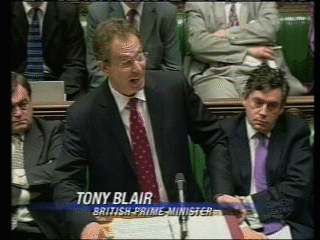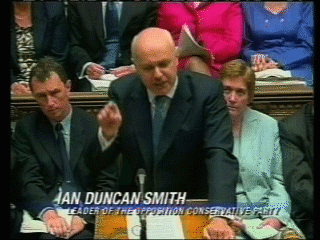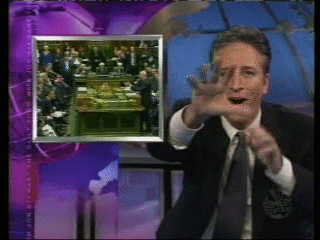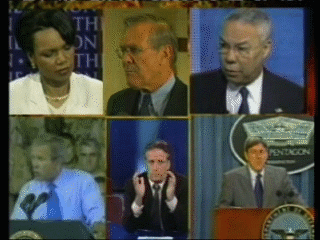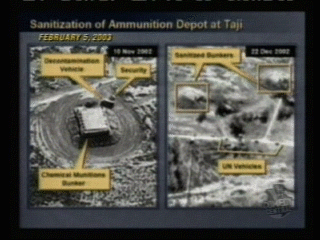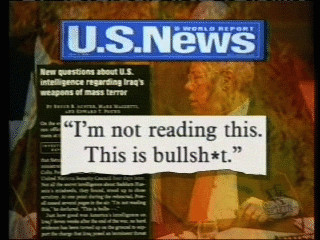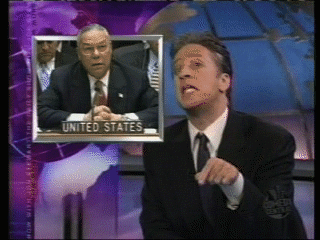US rivals turn on each other as weapons search draws a blank
One key argument for war was the peril from weapons of mass destruction. Now top officials are worried by repeated failures to find the proof – and US intelligence agencies are engaged in a struggle to avoid the blame
By Paul Harris and Martin Bright in London, Taji and Ed Helmore in New York for the Observer.
The Iraqi military base at Taji does not look like a place of global importance. It is a desolate expanse of bunkers and hangars surrounded by barbed wire and battered look-out posts. It is deserted apart from American sentries at the gate.
Yet Taji, north of Baghdad, is the key to a furious debate. Where are Saddam’s weapons of mass destruction? Was the war fought on a platform of lies? Taji was the only specific location singled out by Secretary of State Colin Powell in his address to the UN when he argued that evidence compiled by US intelligence proved the existence of an illegal weapons programme. ‘This is one of 65 such facilities in Iraq,’ Powell said. ‘We know this one has housed chemical weapons.’
But The Observer has learnt that Taji has drawn a blank. US sources say no such weapons were found when a search party scoured the base in late April. By then it had already been looted by local villagers. If Taji ever had any secrets, they are long gone. That is bad news for Britain and the United States. The pressure is building to find Saddam’s hidden arsenal and time is running out.
Last week the US flew 2,000 more experts into Iraq. The Iraq Survey Team will join 600 experts already there. Organisations in Iraq hunting for weapons now include teams from the US and British armies, the CIA, the FBI and the Defence Threat Reduction Agency. Yet at more than 110 sites checked so far they have found nothing conclusive. It has been an exercise in false alarms. Suspect white powder at Latifiyah was only explosives. Barrels of what was thought to be sarin and tabun nerve agents were pesticides. When a dozen US soldiers checked a suspect site and fell ill, it was because they had inhaled fertiliser fumes. Each setback ratchets up the political pressure. Infighting between government departments and intelligence agencies is becoming vicious on both sides of the Atlantic. Having fought a war to disarm Iraq of its terrible weapons, neither the US nor Britain can admit that Iraq never had them in the first place. The search for weapons of mass destruction cannot be allowed to fail.
The search is especially vital for The Cabal. In the brave new world of post-11 September America, this tight group of analysts deep in the heart of the Pentagon has been the driving force behind the war in Iraq. Numbering no more than a dozen, The Cabal is part of the Office of Special Plans, a new intelligence agency which has taken on the CIA and won. Where the CIA dithered over Iraq, the OSP pressed on. Where the CIA doubted, the OSP was firm. It fought a battle royal over Iraq and George Bush came down on its side.
The OSP is the brainchild of Defence Secretary Donald Rumsfeld, who set it up after the 2001 terrorist attacks. It was tasked with going over old ground on Iraq and showing that the CIA had overlooked the threat posed. But its rise has caused massive ructions in the normally secretive world of intelligence gathering.
The OSP reports directly to Paul Wolfowitz, a leading hawk in the administration. They bypassed the CIA and the Pentagon’s own Defence Intelligence Agency when it came to whispering in the President’s ear. They argued a forceful case for war against Saddam before his weapons programmes came to fruition. More moderate voices in the CIA and DIA were drowned out. The result has been a flurry of leaks to the US press. One CIA official described The Cabal’s members as ‘crazed’, on a ‘mission from God’.
But for the moment The Cabal and Rumsfeld’s Pentagon have won and Powell’s doveish State Department has lost. Tensions between the two are now in the open.
